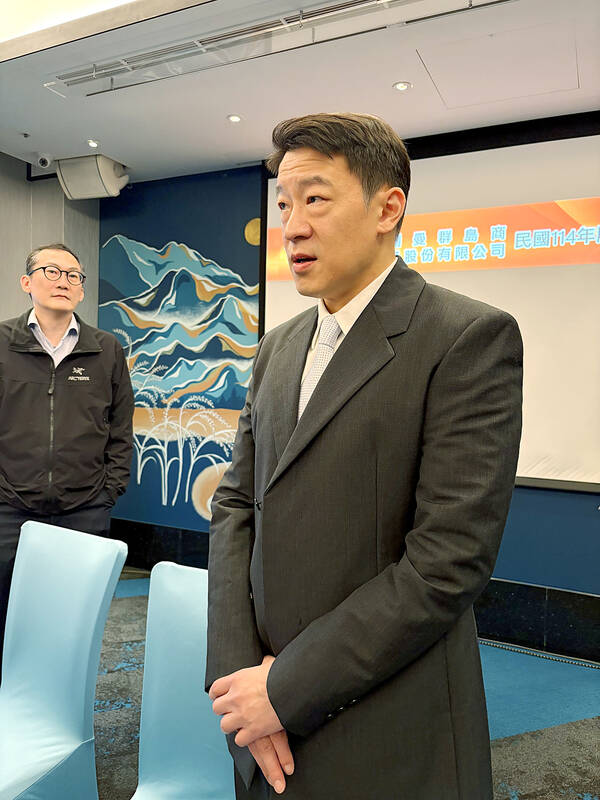Alchip Technologies Ltd (世芯), an application-specific integrated circuit (ASIC) designer specializing in artificial-intelligence (AI) chips, yesterday said that small-volume production of 3-nanometer (nm) chips for a key customer is on track to start by the end of this year, dismissing speculation about delays in producing advanced chips.
As Alchip is transitioning from 7-nanometer and 5-nanometer process technology to 3 nanometers, investors and shareholders have been closely monitoring whether the company is navigating through such transition smoothly.
“We are proceeding well in [building] this generation [of chips]. It appears to me that no revision will be required. We have achieved success in designing the chip,” Alchip CEO Johnny Shen (沈翔霖) said in response to a shareholder’s question about its 3-nanometer chip progress during the company’s annual shareholders’ meeting.

Photo: Lisa Wang, Taipei Times
“Volume production will be on schedule. We expect to start small-volume production at the end of the year, before ramping up to a significant volume next year,” Shen said. “This 3-nanometer chip is for a major customer.”
Total orders for 3-nanometer chips from the customer would exceed that for 7-nanometer chips, Shen said.
That bodes well for the company’s revenue next year, when it ramps up production of the chip given the dramatic rise in average selling prices for 3-nanometer chips.
Alchip made about US$1.6 billion in revenue through the whole lifecycle of the 7-nanometer chip from design to mass production, it said.
Alchip is reportedly designing the new 3-nanometer chip, called Trainium 3, for Amazon Web Services. Alchip customizes chips for customers and also serves as a coordinator for customers to produce chips at foundry service providers such as Taiwan Semiconductor Manufacturing Co (台積電).
With 3-nanometer chips ready to be shipped, Alchip has started development of 2-nanometer chips, Shen said.
Building on its success in offering 3-nanometer chip design services, the company is confident about providing 2-nanometer chips to the same customers, he told investors earlier this month.
“This is a must-win [project],” Shen said yesterday.
The company’s research-and-development efforts are to extend to new-generation AI chips and advanced packaging technologies, including 2.5-dimension and 3-dimension technologies, Shen said.
The firm has helped customers secure capacities for advanced packaging technology, or chip-on-wafer-on-substrate (CoWoS).
The company’s shareholders yesterday approved a proposal to distribute a record-high cash dividend of NT$40.05 per share.
That represented a payout ratio of 49 percent based on the company’s earnings per share of NT$81.34 last year.
Shareholders also gave the green light to a proposal to issue 1.5 million common shares through a private placement, as Alchip aims to introduce strategic partners and strengthen its long-term cooperation with existing partners.
Last year, Amazon.com Inc subscribed to 224,537 shares, or 0.28 percent, of Alchip for NT$535 million through a private placement.
The company’s board of directors yesterday elected Alchip CEO Johnny Shen as the company’s new chairman and re-elected Alchip CFO Daniel Wang and Herbert Chang (張國威), General Partner of GrowStar Partners Group Limited), as board directors.
While, 4 new independent directors were added to the chip company's 7-member board including Jerry Tzou (鄒覺倫), Director in Advanced Packaging Business Development of TSMC, Andrew Kuo (郭明鑑), Chairman of Cathay United Bank (國泰世華銀行), Derek Tien (田至元 ), Managing Director of GIC Private Ltd, Saria Tseng (曾馨嫻), Vice President and General Counsel & Corporate Secretary of MaXXan Systems Inc.

Shares in Taiwan closed at a new high yesterday, the first trading day of the new year, as contract chipmaker Taiwan Semiconductor Manufacturing Co (TSMC, 台積電) continued to break records amid an artificial intelligence (AI) boom, dealers said. The TAIEX closed up 386.21 points, or 1.33 percent, at 29,349.81, with turnover totaling NT$648.844 billion (US$20.65 billion). “Judging from a stronger Taiwan dollar against the US dollar, I think foreign institutional investors returned from the holidays and brought funds into the local market,” Concord Securities Co (康和證券) analyst Kerry Huang (黃志祺) said. “Foreign investors just rebuilt their positions with TSMC as their top target,

REVENUE PERFORMANCE: Cloud and network products, and electronic components saw strong increases, while smart consumer electronics and computing products fell Hon Hai Precision Industry Co (鴻海精密) yesterday posted 26.51 percent quarterly growth in revenue for last quarter to NT$2.6 trillion (US$82.44 billion), the strongest on record for the period and above expectations, but the company forecast a slight revenue dip this quarter due to seasonal factors. On an annual basis, revenue last quarter grew 22.07 percent, the company said. Analysts on average estimated about NT$2.4 trillion increase. Hon Hai, which assembles servers for Nvidia Corp and iPhones for Apple Inc, is expanding its capacity in the US, adding artificial intelligence (AI) server production in Wisconsin and Texas, where it operates established campuses. This

US President Donald Trump on Friday blocked US photonics firm HieFo Corp’s US$3 million acquisition of assets in New Jersey-based aerospace and defense specialist Emcore Corp, citing national security and China-related concerns. In an order released by the White House, Trump said HieFo was “controlled by a citizen of the People’s Republic of China” and that its 2024 acquisition of Emcore’s businesses led the US president to believe that it might “take action that threatens to impair the national security of the United States.” The order did not name the person or detail Trump’s concerns. “The Transaction is hereby prohibited,”

Garment maker Makalot Industrial Co (聚陽) yesterday reported lower-than-expected fourth-quarter revenue of NT$7.93 billion (US$251.44 million), down 9.48 percent from NT$8.76 billion a year earlier. On a quarterly basis, revenue fell 10.83 percent from NT$8.89 billion, company data showed. The figure was also lower than market expectations of NT$8.05 billion, according to data compiled by Yuanta Securities Investment and Consulting Co (元大投顧), which had projected NT$8.22 billion. Makalot’s revenue this quarter would likely increase by a mid-teens percentage as the industry is entering its high season, Yuanta said. Overall, Makalot’s revenue last year totaled NT$34.43 billion, down 3.08 percent from its record NT$35.52